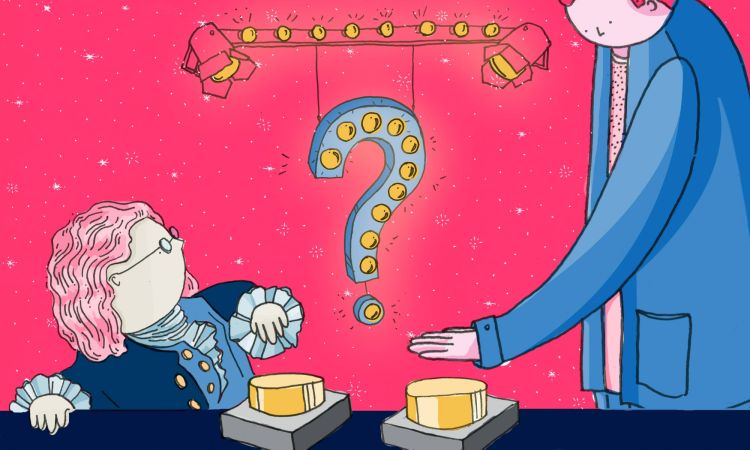
In the 1820s, books were a rare and precious luxury for most Americans. The radical idea of free knowledge access for all ages — aka the public library system — had yet to flower in the United States. Still, there were voracious readers on the frontier — including an impoverished young Abraham Lincoln, notes Doris Kearns Goodwin (TED Talk: Lessons from past presidents). Like Lincoln, most self-educated Americans of the 19th century embraced a vast constellation of topics — including natural history, Christian allegory and all things Shakespeare.
“Get the books, and read and study them. the books, and your capacity for understanding them, are just the same in all places.” — Abraham Lincoln
Ready to match wits with a 19th-century student? Read on! (You’ll find the answer key at the end.)
1. Choose a, b, c or d:
In John Bunyan’s popular novel, The Pilgrim’s Progress From This World to That Which Is to Come, the protagonist has issues. What’s wrong?
a) He’s left to tumble in the Slough of Despond, alone.
b) He gets some lousy advice from Mr. Worldly Wiseman, of the town of Carnal Policy.
c) He has to fight a seven-headed, ten-horned, dragon-bodied monster.
d) All of the above, and then some.
2. Do the math:
A snail in getting up a pole, 20 feet high, was observed to climb up 8 feet every day, but to descend 4 feet every night. How long did it take the snail to reach the top of the pole?
3. Finish this quote from William Shakespeare’s Julius Caesar, Act 1, Scene 2:
The fault, dear Brutus, is not in our stars, / But in ourselves, that we are ______.”
4. Answer this question:
What is the state of birds when moulting?
5. Diagram this sentence:
“Time slept on flowers and lent his glass to hope.”
6. Provide the year:
The first non-native settlement was made in New York around the year _____, by some Dutch traders at Albany.
7. Supply the noun:
“The change of y into ies to form the plural number, may seem to a foreigner an odd irregularity; but the cause is very obvious. Formerly the singular number of this class of words ended with ie; as glorie, vanitie, energie, and the addition of s made the plural glories. But from caprice, negligence, or a desire to simplify the orthography, the termination ie was laid aside for y in the singular, while the old plural ies was retained. A strange inconsistency, but by no means the only one which the _____ of our language exhibits.”
8. Finish this sentence:
“A celebrated modern writer says, ‘Take care of the minutes, and the hours will take care of themselves.’ This is an admirable remark, and might be very seasonably recollected when we begin to be ‘weary in well-doing’ from the thought of having much to do. The present moment is all we have to do with, in any sense; the past is irrecoverable; the future is uncertain; nor is it fair to burden one moment with the weight of the ______.”
9. Fill in the blank:
“The great objects to which every public speaker should direct his attention, in forming his delivery, are, first, to speak so as to be fully and easily understood by his hearers; and next, to express himself with such grace and energy, as to please and to ______ them.”
10. Have you read The Aeneid, by Virgil?
a) No.
b) Yes, in translation.
c) Yes, in Latin.
d) Reply hazy try again.
Answers: 1 (d), 2 (4 days), 3 (underlings), 4 (weak and languid), 5 (check your diagram at the link), 6 (1614 according to this 19th-century history text; however, it’s wrong. Today’s historians believe that the first non-native American settlement was really in St. Augustine, Florida, in the 1500s, by the Spanish. History changes, people.), 7 (progress), 8 (next), 9 (move), 10 (really?)
Illustration by Dawn Kim.











